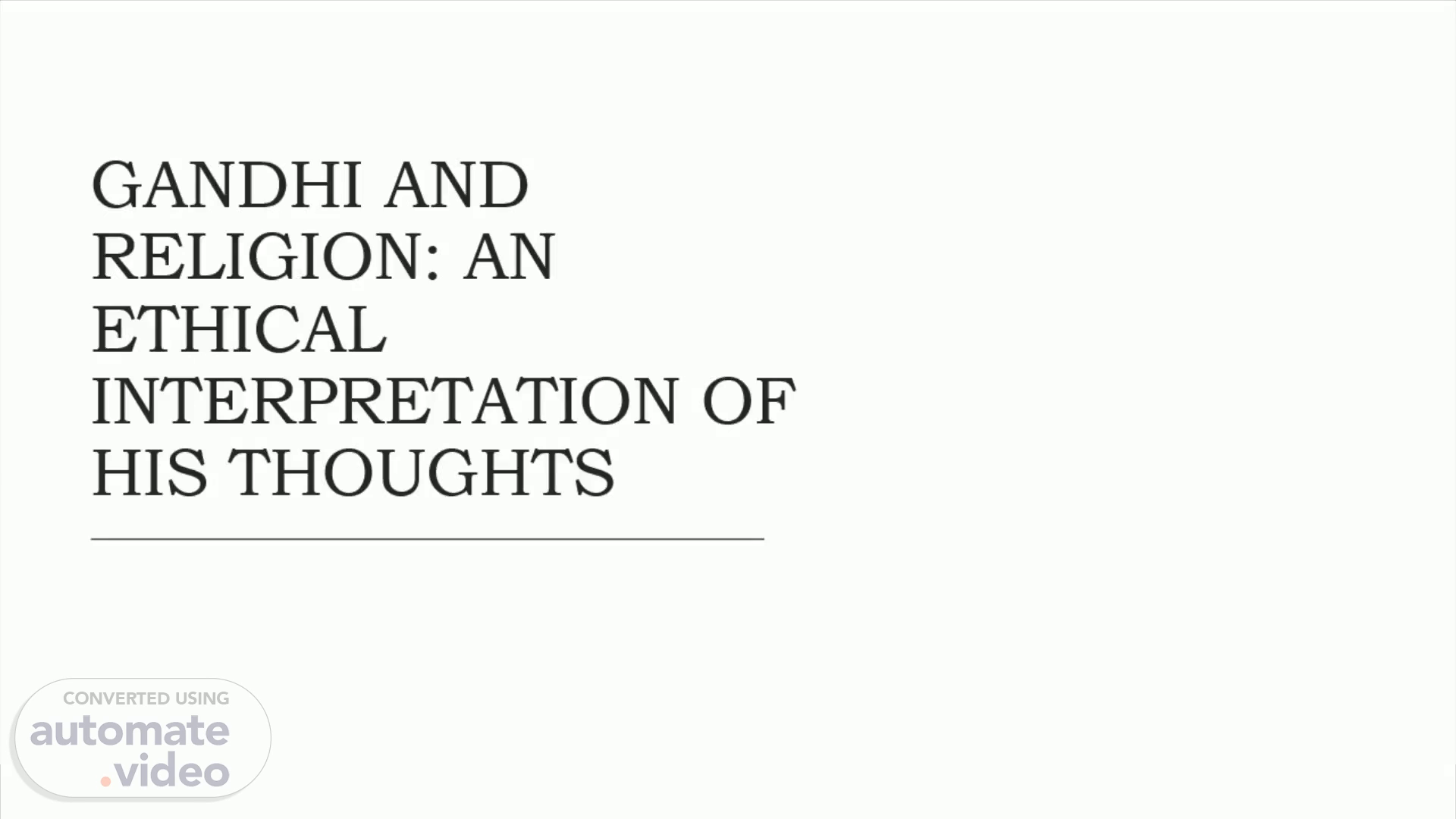
GANDHI AND RELIGION: AN ETHICAL INTERPRETATION OF HIS THOUGHTS
Scene 1 (0s)
BY: SANSKRITI MANCHANDA 5B. GANDHI AND RELIGION: AN ETHICAL INTERPRETATION OF HIS THOUGHTS.
Scene 2 (8s)
CONTENT. Shape Description automatically generated with low confidence.
Scene 3 (20s)
INTRODUCTION. Religion is an integration of various moral aspects of the human life. Ethics is held to be the science of ideals. Mohandas Karamchand Gandhi was the prominent leader of Indian nationalism in British-ruled India. He employed non-violent civil disobedience, led India to independence and inspired movements for civil rights and freedom across the world. The philosophy of Gandhi exists on several planes, the spiritual or religious, moral, political, economic, social, individual and collective. Gandhi has synthesized religion and ethics, for he thinks, that ethics does not preclude religion. He was willing to adopt any idea from any source. He was influenced by several persons and intellectuals ranging from house-made Rambha to eminent thinker and writer like Tolstoy. Gandhi tries to understand the spirit of the various scriptures of the world..
Scene 4 (52s)
NATURE OF RELIGION. Religion is a pervasive and almost a universal phenomenon in the human societies. Although the word religion is used without any hesitation, it is difficult to give correct meaning to it. The oxford dictionary defines it, “Religion as recognition on the part of man of some unseen higher power as having control of his destiny and as being entitled to obedience, reverence and worship”. The essence of religion is the belief in the most important values which are in harmony with the enduring structure of the universe. Gandhi brought down religion from the cloistered seclusion of yogic contemplation to man’s socio-political life of clash and conflict..
Scene 5 (1m 20s)
RELIGION AND REASON. If man can give sufficient reason for the faith he has, that religion becomes meaningful and purposive. Gandhi does not plead for the suppression of reason. As such of subjects cannot take us far; we must make room for faith for subjects of this nature. There are subjects’’ says Gandhi, where reason cannot take us far and we must accept things on faith. Faith then does not contradict reason but transcends it. Faith is a kind of sixth sense which works on cases which are without the preview of reason. Gandhi on the other hand, declines to be bound by any interpretation, however, learned it maybe, if it is repugnant to reason or moral sense..
Scene 6 (1m 44s)
RELIGION AND HUMAN LIFE. Gandhi considers the human life as an integral whole which cannot be divided into water-tight compartments – social, economic, political and religion. All act and react upon one another. Religion pervades the entire texture of human life. He believes on the other hand that spiritual law expresses itself through the ordinary activities of human life. If one gain spiritually, says Gandhi, the whole world gains with him and if one man falls, the whole world falls to the extent. As a result, the immediate service to all the humanity becomes necessary. Gandhi could not find god apart from the rest of the human activity. So, Gandhi has much concern for the suppressed and the oppressed classes and he proclaimed about the oppressed that, there is no greater sin than to oppress the innocent in the name of god..
Scene 7 (2m 15s)
RELIGION AND MORALITY. Morality is possible without religion, but religion contributes greatly to the growth of morality. True morality does not consist in following the beaten track but in finding the truth and fearlessly following it. Religion is to morality what water is to the seed that is sown in the soil. According to Gandhi, religion provides a moral basis to all our activities. For Gandhi there is no religion higher than Truth and Righteousness. He does not accept any unreasonable religious sentiments that are not moral. His main object is to equalize religion with morality and make religion dynamically operative in the human life. He attributes all social and human values to god. In view of Gandhi, God is truth and love. God is ethics and morality. God is fearlessness..
Scene 8 (2m 42s)
GANDHI ON RELIGION. Religion is not an ‘ism’, and it is not merely intellectual knowledge or belief in any set of doctrines, but an innate attribute of the soul. It enables to define the human duties in life and establish correct relationship with the fellow-beings. But before this, is need to have the knowledge of the self of its true nature. Thus, religion is the means, in the first place of the self realization or realization of the true nature of self. Gandhi opined that the highest moral law is that in which we should unremittingly work for the good of making. Gandhi regarded only voluntary action as moral. He maintained that “no action which is not voluntary can be called moral.” Humanism believes in doing well to others as the way of highest moral life. Religion without morality would mean a mere escape from responsibility. The careful examination and observation helps to make the ethical concepts as guide to the human conduct..
Scene 9 (3m 11s)
CONCLUSION. A picture containing text, person Description automatically generated.